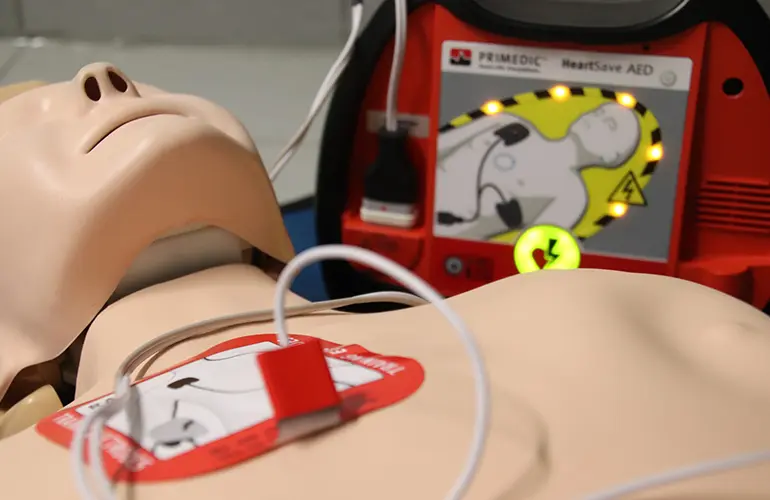FDA adds AEDs and other medical devices to shortage list

Collected Image
The FDA has added automated external defibrillators (AEDs), chest drains/suction canisters and autotransfusion systems to its list of medical devices in short supply. AEDs — including wearable and nonwearable versions of the devices — are expected to be in limited supply for at least the rest of 2022, the FDA said. The agency cited both an increase in demand for AEDs and the global shortage of semiconductors used in the devices.
“The FDA continues to work with federal partners and other stakeholders to help mitigate challenges associated with semiconductor shortages,” the FDA said in yesterday’s update to the device shortage list. “In addition, the FDA has issued guidance documents, including enforcement policies, regarding circumstances where manufacturers may consider modifying their devices because of supply chain issues, such as semiconductor supply challenges.” The FDA said increased demand is also behind the shortage of chest drains/suction canisters and autotransfusion systems, though it could not estimate how long the shortage would last. The FDA did not identify the semiconductor shortage or other component, part or accessory supply issues for these devices.
At the same time, the regulatory agency removed medical gowns and surgical masks from its medical device shortage list. Under the Coronavirus Aid, Relief, and Economic Security Act (CARES Act), medical device manufacturers are required to notify the FDA of manufacturing interruptions for critical products if they’re likely to lead to meaningful supply disruptions in the U.S.
Semiconductors have been in short supply due to throughout the COVID-19 pandemic, mainly due to fabrication disruption (including fabs in Texas knocked offline by a cold-weather power outage last year) and high demand for cars and consumer electronics.
The medical device industry only makes up about 1% of the global demand for semiconductors, but even giants like Medtronic have had a hard time getting enough chips — or exactly the right kind — for their devices.
The medical device industry’s Advanced Medical Technology Association (AdvaMed) has lobbied the Biden administration to prioritize chip supplies for the medical device industry, while lawmakers are advancing a $52 billion package of subsidies for domestic chip manufacturing.
“The FDA continues to work with federal partners and other stakeholders to help mitigate challenges associated with semiconductor shortages,” the FDA said in yesterday’s update to the device shortage list. “In addition, the FDA has issued guidance documents, including enforcement policies, regarding circumstances where manufacturers may consider modifying their devices because of supply chain issues, such as semiconductor supply challenges.” The FDA said increased demand is also behind the shortage of chest drains/suction canisters and autotransfusion systems, though it could not estimate how long the shortage would last. The FDA did not identify the semiconductor shortage or other component, part or accessory supply issues for these devices.
At the same time, the regulatory agency removed medical gowns and surgical masks from its medical device shortage list. Under the Coronavirus Aid, Relief, and Economic Security Act (CARES Act), medical device manufacturers are required to notify the FDA of manufacturing interruptions for critical products if they’re likely to lead to meaningful supply disruptions in the U.S.
Semiconductors have been in short supply due to throughout the COVID-19 pandemic, mainly due to fabrication disruption (including fabs in Texas knocked offline by a cold-weather power outage last year) and high demand for cars and consumer electronics.
The medical device industry only makes up about 1% of the global demand for semiconductors, but even giants like Medtronic have had a hard time getting enough chips — or exactly the right kind — for their devices.
The medical device industry’s Advanced Medical Technology Association (AdvaMed) has lobbied the Biden administration to prioritize chip supplies for the medical device industry, while lawmakers are advancing a $52 billion package of subsidies for domestic chip manufacturing.
Source: https://www.medicaldesignandoutsourcing.com
Tags :
Previous Story
- Nanotechnology in Medicine: Regulatory trends
- 4 key challenges in sustaining compliance in the...
- How a sports apparel company helped one Virginia...
- Irish medtech start-up SymPhysis Medical raises €1.9m
- Salary remains a key motivator for 74% Indians;...
- Can a dangerous microbe offer a new way...
- 'Your doctor is in:' Physicians test humanoid robot...
- The Tuscan retreat where you can live like...